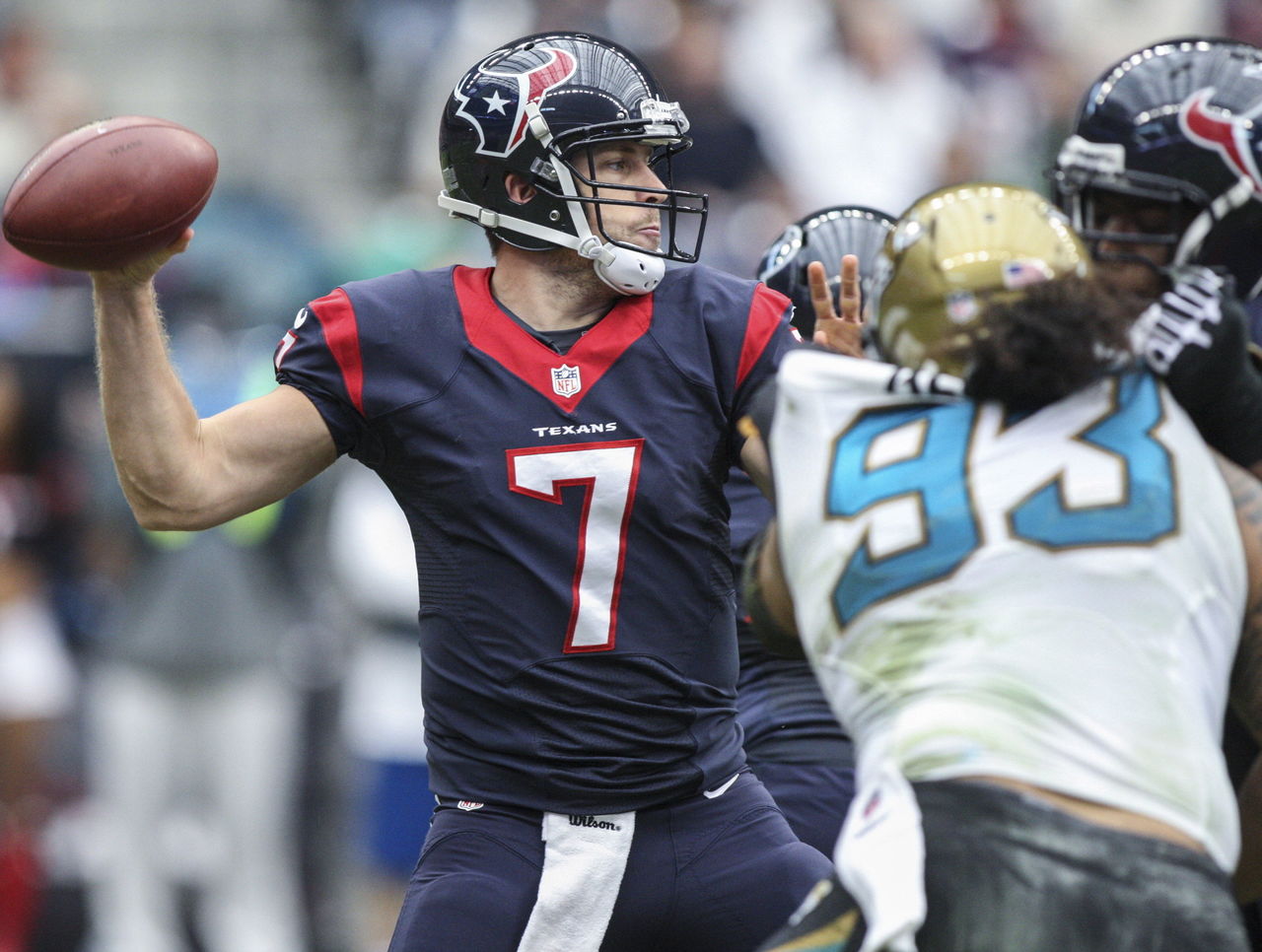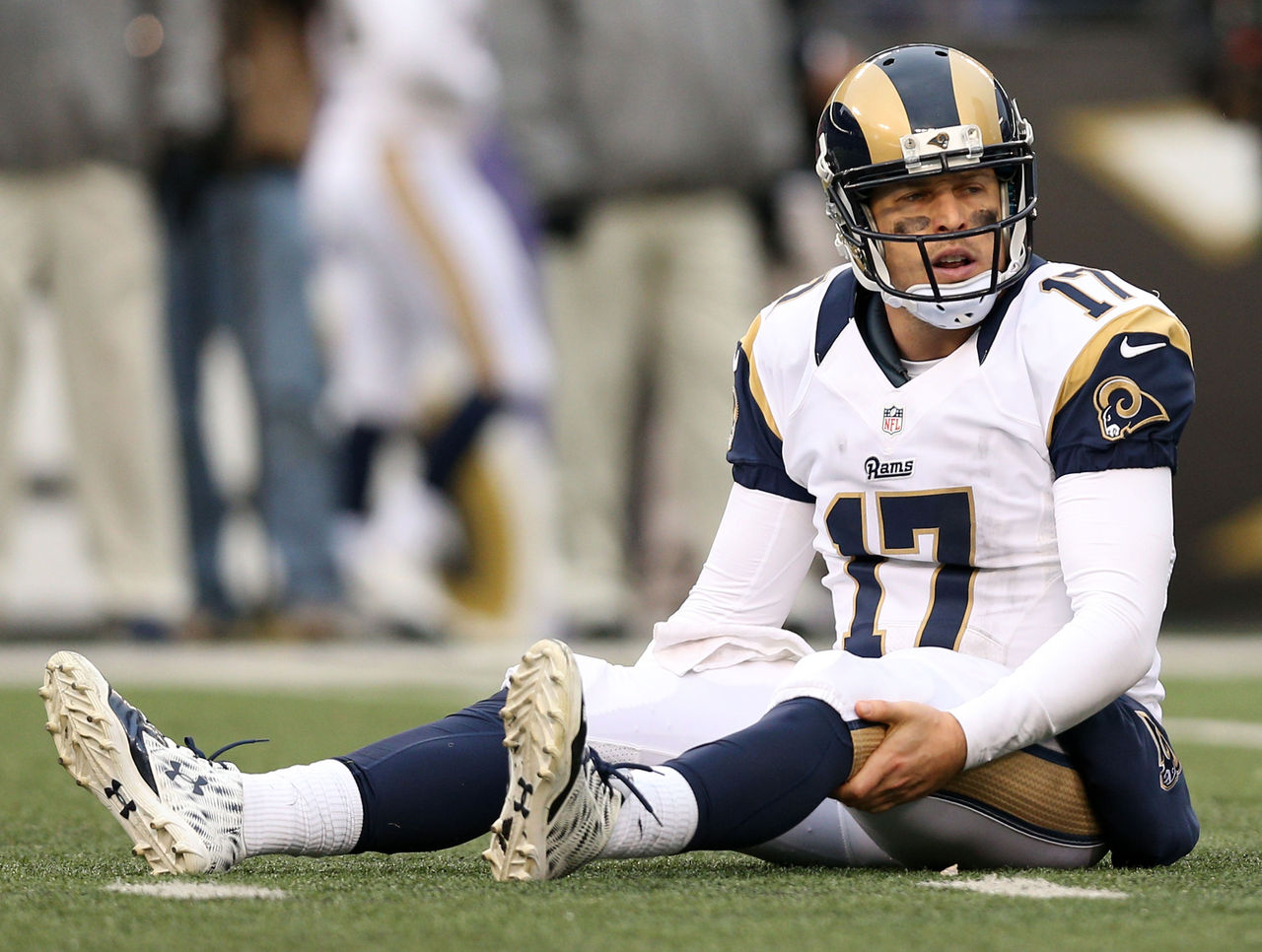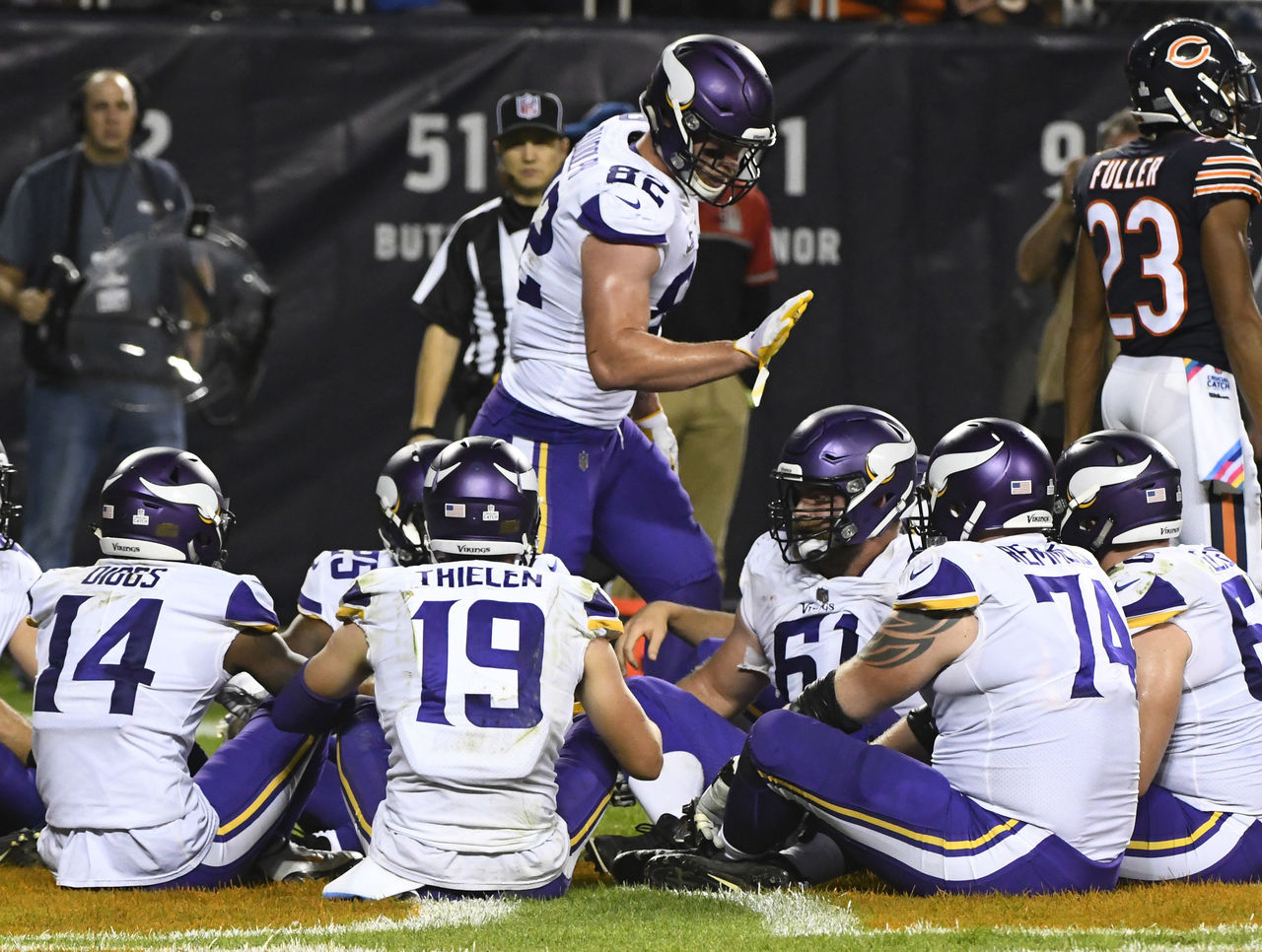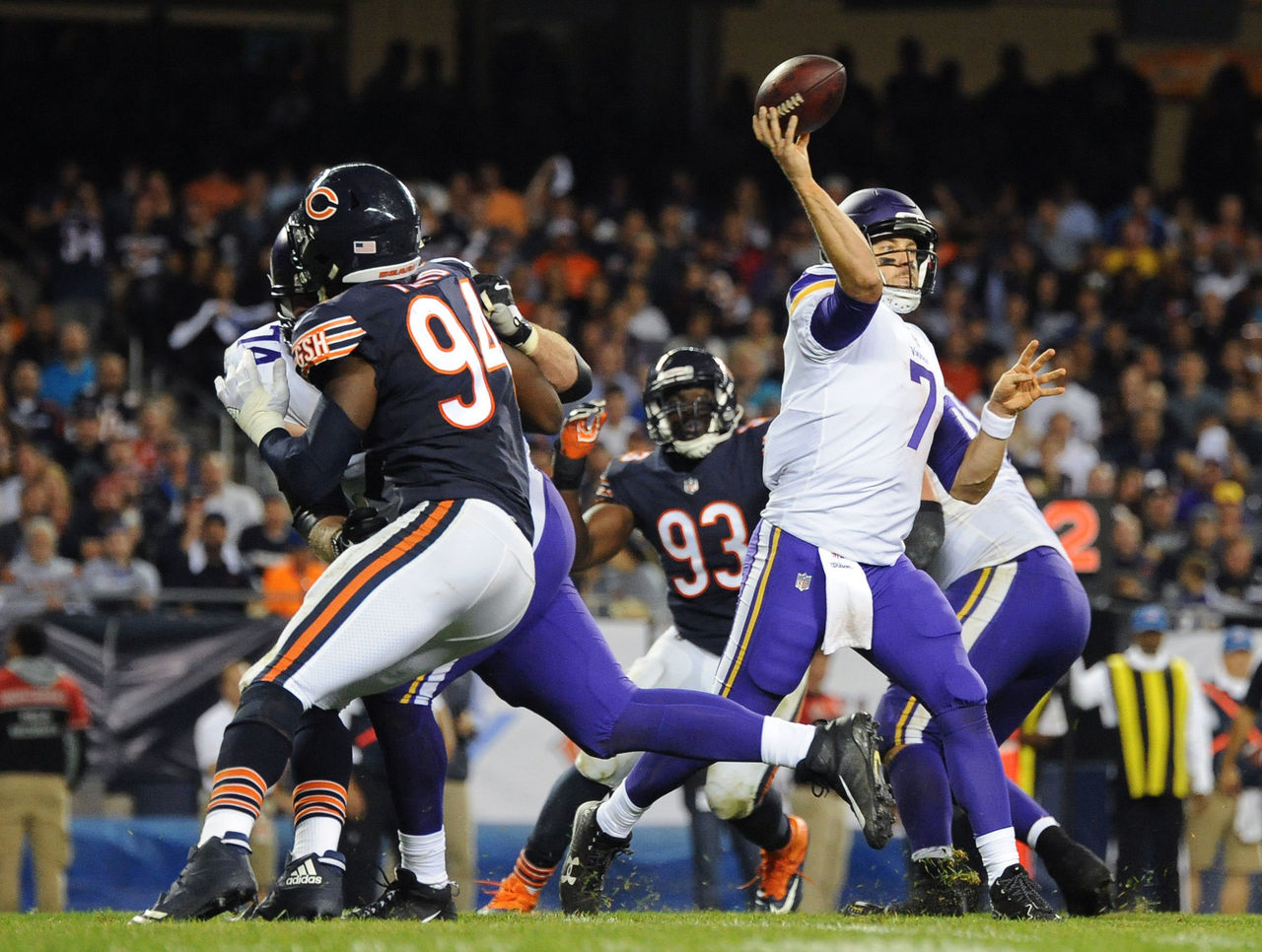Sage Rosenfels column: Well-traveled Keenum the key to Vikings' early success
Sage Rosenfels is a former 12-year NFL quarterback who writes, does radio, and podcasts about the NFL and college football. Find him on Twitter @SageRosenfels18.
Fourteen months ago, the Minnesota Vikings lost franchise quarterback Teddy Bridgewater to a catastrophic knee injury and replaced him with Sam Bradford. After Bradford played the best game of his career to open 2017, an injury has limited him to just one half of football in the past five weeks.
Over the offseason, the Vikings released Adrian Peterson, the franchise's greatest running back, and drafted Dalvin Cook, who quickly became a premier player for the Vikings. He, too, is no longer available after tearing his ACL in Week 4 against the Detroit Lions.
Yet, despite all of this, Minnesota leads the NFC North.
Of all the moves Minnesota made this offseason, from coaching changes to draft picks to free-agent pickups, no move looks as valuable as the signing of veteran backup quarterback Case Keenum.
Keenum has had quite the journey on his way to Minnesota. When I was playing for the Houston Texans roughly 10 years ago, Keenum was just a freshman at the University of Houston. He began stockpiling wins and great stats for the Cougars, and I've been following his career ever since.
Keenum was well coached in college by Art Briles and Kliff Kingsbury, two of the best offensive minds in the NCAA. Three times he threw for over 40 touchdowns in a season, and even rushed for 23 career scores at Houston. Yet, every team passed on him in the 2012 NFL draft due his lack of size and arm strength, and the fact he played for a non-Power 5 school.
Following his college season, Keenum was signed as an undrafted free agent by the Houston Texans, whose stadium is less than 10 miles from where he played in college. He was a local fan favorite who was getting his shot to make it in the league while playing for Gary Kubiak, who was also raised in Houston.

(Photo courtesy: Action Images)
Keenum played well in the preseason, made the practice squad, and spent the year learning from Kubiak and starter Matt Schaub. In 2013, he made the active roster as the third quarterback, but was chosen over backup T.J. Yates to start when Schaub was injured. He started eight games for Houston that year, winning none.
Kubiak was let go and Keenum was released at the end of the 2014 preseason following the signing of Ryan Mallet, who had played for new head coach Bill O'Brien. This started a back and forth between St. Louis and Houston that lasted for two seasons.
The St. Louis Rams quickly picked him up, put him on their active roster, and then dropped him to their practice squad for a couple months. Then he was picked up off the Rams' practice squad and re-signed by Houston when its starter, Ryan Fitzpatrick broke his leg. Keenum immediately started, and won, the last two games of the season for the Texans.
The next offseason, the Rams wanted Keenum again, so they traded for him to backup newly acquired starter Nick Foles. Over the course of 2015 and 2016, Keenum started 14 games, threw for over 3,000 yards, and earned a respectable quarterback rating in the low 80s.
For years, the Rams' offense was one of the worst in the NFL under Jeff Fisher. The obvious improvement of first overall pick Jared Goff under new head coach Sean McVay shows the lack of good offensive coaching by the Rams over the last few seasons.

(Photo courtesy: Getty Images)
Despite all of this, Keenum endured to become a respected asset that teams needed. He was a valuable backup quarterback who could come into games on short notice, or for long stretches of the season, and give his team a chance to win.
Minnesota GM Rick Spielman - who won the "unlucky GM of the year" award in 2016 after Teddy Bridgewater and Adrian Peterson's injuries - signed Keenum to a solid backup quarterback contract. That move is paying huge dividends for the Vikings.
The quarterback situation has been foggy at best since Bridgewater went down with his knee injury. Bradford is one of the best pure passers in the league, but lacks the ability to make plays when the offensive line breaks down. His knee issues following the Vikings' Week 1 win versus the Saints gave Keenum the opportunity he's been working toward.
Keenum has played extremely well for a backup QB. He is protecting the football, throwing only one interception in 159 passing attempts. His 93.1 passer rating puts him 15th in the NFL - ahead of Russell Wilson, Matthew Stafford, Ben Roethlisberger, Eli Manning, Philip Rivers, Matt Ryan, Cam Newton, Carson Palmer, Joe Flacco, and Marcus Mariota. Every one of these quarterbacks is making at least 10 times what Keenum is earning.
The reasons for Keenum's success are multi-faceted.
First, the Vikings are the most talented team he has played for in his six NFL seasons. Their defense has a slew of Pro Bowl players at all three levels, who are very well coached. Their offense, despite losing rookie sensation Cook, has depth and consistency at the skill positions. Adam Thielen and Stefon Diggs are quickly becoming well-known NFL names.
Tight end Kyle Rudolph is a huge target, and a steady security blanket for Keenum. Since Cook's injury, backup running backs Jerick McKinnon and Latavius Murray have been a nice thunder-and-lightning combo that have kept defenses honest.

(Photo courtesy: Action Images)
The offensive line has been the biggest issue for the Vikings the last few seasons. This offseason, they signed and drafted multiple linemen to completely replace the starters from 2016. They have vastly improved, but their mistakes in pass-blocking have been covered up by Keenum's mobility. This is the biggest difference for the Vikings compared to the previous year.
Bradford simply does not have the ability to regularly make off-schedule plays. When the pocket is clean, and receivers are open, Bradford is one of the best quarterbacks in the NFL. But rarely is the pocket clean, and many times receivers and tight ends need a little extra time to shake away from their defenders. This is why Keenum's value is so important.
The Vikings' offense has changed in Bradford's absence. Offensive coordinator Pat Shurmur has designed, and called, many more bootleg and play actions with Keenum as their QB. Shurmur has quickly figured out the different skill sets that his new quarterback brings to the table. Let us not forget, Keenum entered the league running Gary Kubiak's offense.
This attack weighed heavily on the zone running game, and bootleg/play-action concepts to complement these runs. Keenum is well schooled in the intricacies of the bootleg game. This is paying dividends for Minnesota.
Having a mobile quarterback is a huge advantage in today's NFL. Defensive lines have become so explosive and powerful that it's nearly impossible for an offensive line to keep a quarterback clean for 25-to-35 passes thrown from the pocket every game. We are currently seeing many of the game's best quarterbacks buying extra time to find receivers downfield when the play called in the huddle doesn't work as designed.
Rodgers, Stafford, Dak Prescott, Derek Carr, Carson Wentz, Deshaun Watson, Wilson, Alex Smith, and Cam Newton are a few of the best quarterbacks in the league at extending passing plays when the pocket breaks down. This not only prevents sacks, fumbles, and negative yardage plays, but it also forces defenders to cover receivers for five-to-seven seconds, which is nearly impossible.
Quarterbacks who can escape the pocket to find teammates down the field are incredibly frustrating for defensive coordinators, and they give offenses a chance to succeed, even those with suspect offensive lines.

(Photo courtesy: Action Images)
How long Keenum lasts as Minnesota's starting QB is a mystery. Even if Bradford were to get healthy in the coming weeks, which doesn't seem to be the case, I believe the Vikings are better suited to win games with Keenum as their play-caller. He adds too many positive elements to this offense that Bradford simply doesn't possess, while not being much worse of a pocket passer.
What makes matters more foggy is the recent news that Bridgewater has been given clearance to come off the Vikings' PUP list. He will be practicing with the Vikings this week, but his clearance to play in games is unknown.
Keenum is used to being overlooked. He's a great story of perseverance at the hardest position in professional sports. He was unwanted out of college. He has slowly worked his way up from camp arm, to third string, to backup, to fill in until the franchise quarterback is ready. No NFL team has imagined Case Keenum as its franchise quarterback, but right now he's the starter on a team leading the division.
This window of opportunity may not last long for Keenum. Again, he is positioned to play until someone else is healthy enough to take his job. But he is now armed with five-plus years of NFL experience, a history of overcoming limited expectations, and an undying belief in himself.
Keenum has an opportunity to take the next step in his career as an NFL signal-caller. If he continues to win and keep the Vikings in first place, the decision to replace him with Bradford or Bridgewater gets tougher for Spielman and head coach Mike Zimmer.
The Vikings are stating their case as a legitimate contender in the NFC with their "just in case" quarterback. Overcoming the odds is nothing new for Keenum and he'll be stating his case to be a franchise quarterback again this Sunday when the Vikings play the Baltimore Ravens. As always, he'll be betting on himself.